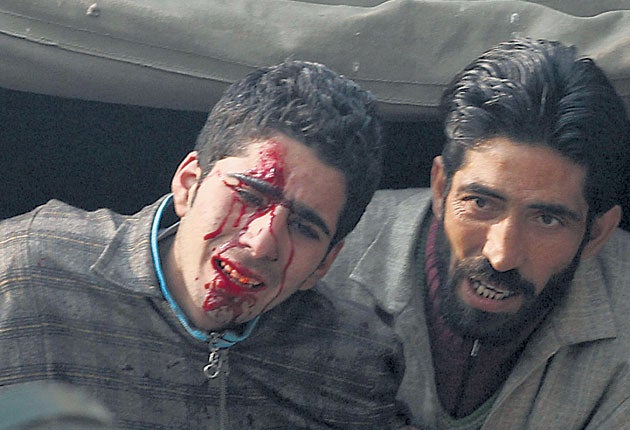Kashmir torture is a thing of the past, says India

Your support helps us to tell the story
From reproductive rights to climate change to Big Tech, The Independent is on the ground when the story is developing. Whether it's investigating the financials of Elon Musk's pro-Trump PAC or producing our latest documentary, 'The A Word', which shines a light on the American women fighting for reproductive rights, we know how important it is to parse out the facts from the messaging.
At such a critical moment in US history, we need reporters on the ground. Your donation allows us to keep sending journalists to speak to both sides of the story.
The Independent is trusted by Americans across the entire political spectrum. And unlike many other quality news outlets, we choose not to lock Americans out of our reporting and analysis with paywalls. We believe quality journalism should be available to everyone, paid for by those who can afford it.
Your support makes all the difference.The chief minister of Kashmir has insisted that the use of torture, alleged in the latest leaked diplomatic cables which claim that Indian security forces had over many years beaten and electrocuted prisoners it suspected were linked to insurgents, is a thing of the past.
The International Red Cross (ICRC) said it complained so many times to the authorities that it had concluded that the Indian government condoned the actions.
Omar Abdullah, who became chief minister of Kashmir at the beginning of last year, told an Indian news channel: "I can only talk about this government both at the Centre [Delhi] and at the state. We are determined not to allow any sort of incidents of custodial torture or any sort of breach of law."
He said there was no need for an inquiry unless he was given specific information about current allegations.
He spoke after a leaked diplomatic cable from 2005 revealed that frustrated ICRC officials had complained to a senior US diplomat in Delhi over abuses carried out by security forces which have been involved in a decades-long fight against militants, many of which trained in Pakistan. The ICRC said there had been systematic "ill-treatment", including being hung from the ceiling, water torture, crushing and sexual abuse.
"There is regular and widespread use of [ill-treatment] and torture by security forces during interrogation. This always takes place in the presence of officers," said the cable. It said the ICRC had raised the issue of prisoner abuse with the government of India for more than a decade, but because nothing changed it was "forced to conclude that the GOI condones torture".
The ICRC said it had made its assessment about abuse by troops and paramilitary forces after visits to detention centres in Kashmir and north-east India between 2002 and 2004.
It said of 1,500 detainees that the Red Cross met, more than half reported "ill-treatment". Of the 852 cases the agency recorded, 171 detainees said they had been beaten, while the rest said they had been subjected to one or more of six forms of torture.
While under international law, the ICRC is one of the few organisations generally permitted access to detainees and prisoners in countries around the world, it has a policy of not discussing its findings with the media so as not to antagonise host governments.
It is unclear whether the US authorities took up the issue of human rights abuses with the government of India.
The issue of Kashmir has long been a cause of friction and turbulence across south Asia, and India and Pakistan have gone to war three times over the formerly independent kingdom. More than 70,000 people may have been killed by a conflict that has seen Kashmir transformed into one of the most militarised places on earth. This summer, dozens of demonstrators and onlookers were killed by the security forces in Kashmir as they responded to widespread protests demanding both autonomy and the rule of law.
India is deeply sensitive about Kashmir, which it considers a solely bilateral issue with Pakistan, and resists any attempts by third parties to intervene. Most visiting politicians learn to avoid the subject. Asked about Kashmir when he visited Delhi last month, Barack Obama said the US "cannot impose a solution to these problems. We are happy to play any role the parties think is appropriate".
Yesterday human rights groupssaid that they were not surprisedby the contents of the cable, leakedto WikiLeaks.
Meenakshi Ganguly of Human Rights Watch said: "The cable should not come as a surprise to the Indian government because human rights groups have repeatedly pointed out that torture is routine in Indian police stations. We have repeatedly said that security forces need better training so that they do not rely on torture and forced confessions to investigate crimes.
"However, in the case of terror suspects, there is an added problem where security forces believe themselves to be judge and jury, and deliver their own verdict that can range from beatings, to severe torture, and even extrajudicial killings. Perhaps now the government will recognise the need for accountability."
Join our commenting forum
Join thought-provoking conversations, follow other Independent readers and see their replies
Comments